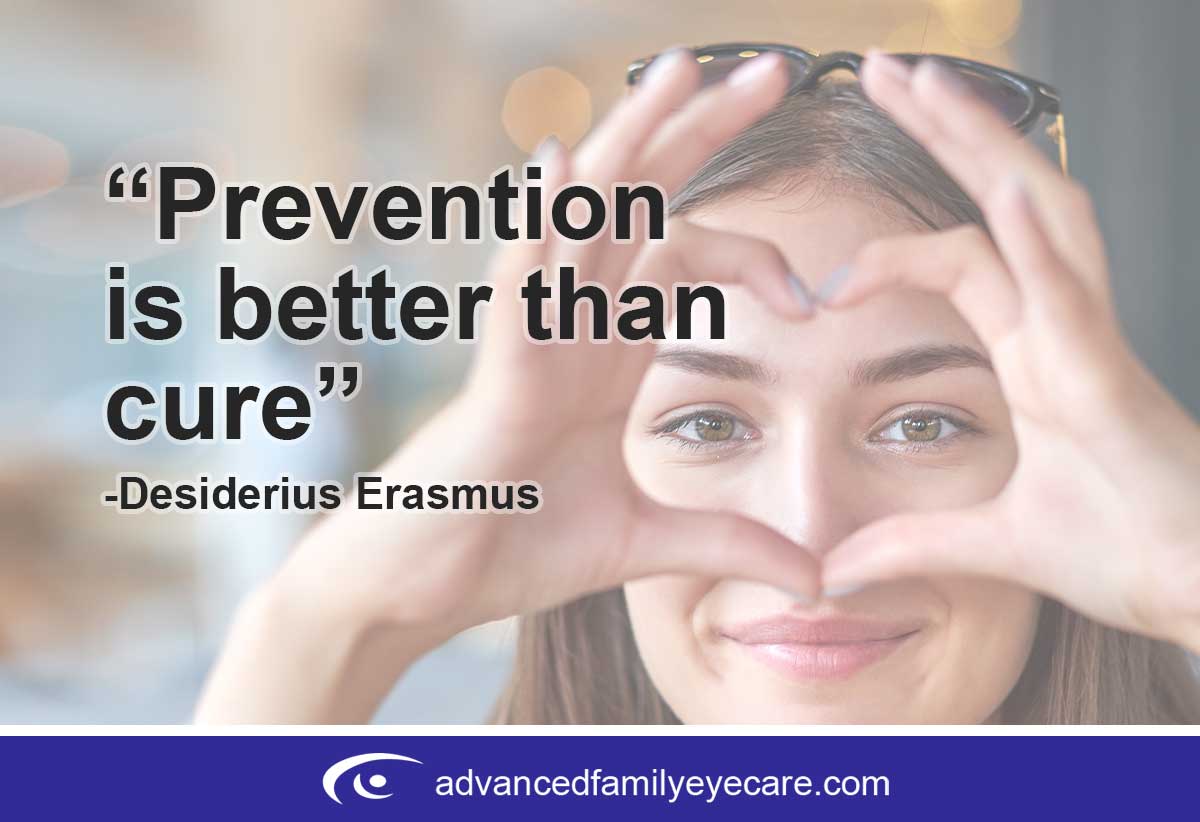How Often Should You Get Your Eyes Checked in 2025?

Reviewed for accuracy by Brad Boyle, OD – Written by Advanced Family Eye Care staff on May 11, 2022 – Last edited on March 30, 2025
 Reviewed for accuracy by Brad Boyle, OD – Written by Advanced Family Eye Care staff on May 11, 2022 – Last edited on March 30, 2025
Reviewed for accuracy by Brad Boyle, OD – Written by Advanced Family Eye Care staff on May 11, 2022 – Last edited on March 30, 2025
Just how often do you actually need to get your eyes checked? Do you really need to see the eye doctor every year, even if you experience no eye discomfort or difficulty seeing? Why can’t you just take an online vision test every now and again and skip the doctor?
As optometrists proudly serving the Cedar Valley region of Northeast Iowa since 1979, we’re here to answer your questions. This is how often you should schedule a visit to the eye doctor in 2025, and why.
How often should you see the eye doctor for an exam?
The American Optometric Association (AOA) recommends the following eye exam schedule for individuals who are asymptomatic or at low risk:
- At least once between 6–12 months of age
- At least once between 3–5 years of age
- Annually from ages 6–17
- At least once every two years from ages 18–64
- Annually at age 65 and older
For individuals who are symptomatic or considered high risk*, the recommended frequency increases:
(*High-risk individuals include those with a family history of eye disease, those who wear contact lenses, have high or progressive refractive errors, or have other eye-related health concerns.)
- At least once between 6–12 months of age, or as recommended
- At least once between 3–5 years of age, or as recommended
- Annually from ages 6–17, or as recommended
- Annually from ages 18–64, or as recommended
- Annually at age 65 and older, or as recommended
In summary:
The AOA generally recommends annual eye exams for most people, with two key exceptions: young children* and healthy, low-risk adults**.
* Young children: Children under age 6 should be seen twice by age 5, unless otherwise advised by their doctor.
** Healthy, low-risk adults: Adults ages 18–64 who are symptom-free may be seen every two years, unless their doctor recommends otherwise.
5 Benefits of Seeing The Eye Doctor for An Exam Every Year
At Advanced Family Eye Care, we encourage being proactive about the health of your precious eyes with annual exams – regardless of your age or eye status – Here’s why.
1. Catch eye threats early on

As the popular saying goes, “prevention is better than cure.” In other words, the best time to see the eye doctor is when your eyes feel fine.
Many eye issues begin without symptoms, and only an eye doctor can detect them. Early diagnosis and treatment can be the difference between a minor inconvenience and a life-changing condition.
According to the International Agency for the Prevention of Blindness (IAPB), approximately 90% of vision loss worldwide is preventable or treatable with existing interventions.
The World Health Organization (WHO) also reports that over 1 billion cases of vision impairment worldwide could have been prevented or have yet to be addressed.
Regular eye exams are the only way to ensure that you are staying on top of your eye health and catching potential threats or conditions early for appropriate treatment.
2. Monitor your health beyond the eyes
An eye exam goes beyond basic visual acuity tests and even beyond eye health.
In fact, an eye exam can identify early warning signs of hundreds of diseases unrelated to your vision – including stroke risks, high blood pressure, autoimmune diseases and signs of cancer.
At Advanced Family Eye are, we view ourselves as part of each person’s primary healthcare team, working closely with primary care providers on behalf of our patients to provide coordinated care.
Just as you should you should see your primary care physician regularly, you should see the eye doctor as part of your overall health & wellbeing regimen.
3. Ensure optimal visual acuity

We experience the world through our eyes, and its important to ensure that they are achieving optimal visual acuity (vision sharpness).
Our eyes change shape frequently. Whether your vision is currently being corrected or not, it is possible that your vision has further changed to less than 20/20 and you don’t even know it.
The best way to ensure that your eyes are performing their best is with an annual visual acuity test from the eye doctor.
What about a simple online vision screening test? Those can be useful, but they have lots of room for error and only indicate the potential need for further screening by an eye care specialist.
The only way to ensure optimal vision & eye health is from a visit to your local optometrist.
4. It’s quick, painless & affordable

Odds are, you’ve had your eyes dilated before and it wasn’t the most pleasant experience. Good news – while dilation is still an important part of many exams, the advancement of diagnostic tools has provided optometrists with opportunities to take a closer look at eyes without dilation in most routine check-ups.
At Advanced Family Eye Care, we pride ourselves on getting to know you and your eyes in a comfortable & family-friendly environment. Who knows, you may even enjoy yourself at your next check-up.
What about the price? Do you really need to go to the eye doctor every year, or can you save money by being more reactive about your eye health?
Most eye doctors have extensive insurance networks, resulting in little-to-no out of pocket expense for your visit. Take full advantage of the insurance that you pay for with annual eye exams.
Even with no insurance or out-of-network cases, the national average cost of an eye exam is around $150. That amounts to just 41 cents a day for an annual eye exam – a small price to pay for healthy eyes. The eye doctor can also offer additional savings on things like prescription eyewear & contact lenses.
5. Experience peace of mind

Eye care is not an expense, but an investment in your overall wellbeing & peace of mind.
We only get one body, one set of eyes – ensure the best for them by adding annual eye exams to your overall health plan.
The bottom line
Eye experts strongly encourage regular eye exams, even for those with no eye symptoms or risk factors. In most cases, regularly means at least once annually or as recommended by your eye care specialist.
Eye exams are not only the only the best way to ensure eye health, but they are an important part in any overall wellbeing plan.








